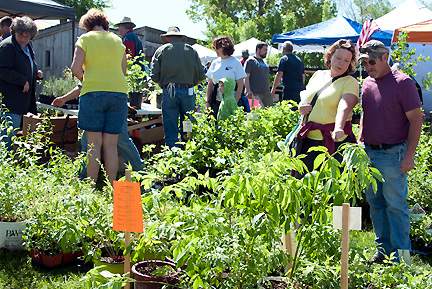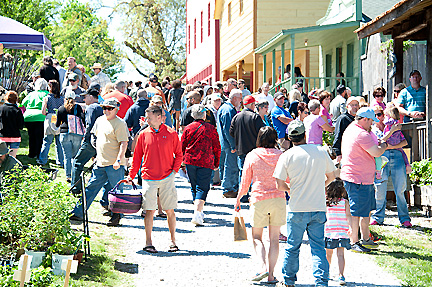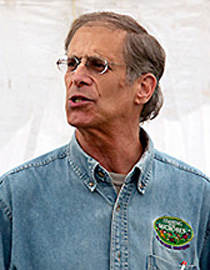
Visitors (far right) to the Baker Creek Spring Planting Festival discuss the merits of a plant that was one of many heritage varieties available for purchase.
While perusing Baker Creek's rare seed catalog is fun, especially when snow covers the ground, it doesn't compare to being surrounded by plants. The Mansfield, Missouri purveyor of heirloom seeds welcomes visitors to their largest festival of the year. The Spring Planting Festival recently was held on the first two days of May in 2016.
"We want to educate everyone about a better, safer food supply," said Jere Gettle, who with his wife Emilee operate several seed company locations as well as having branched out into other related projects, such as publishing Heirloom Gardener magazine.
Those in the know bring small wagons to the festival to carry off their purchases. Most have decided in advance what plants will complete their garden projects. Some take advantage of the knowledgeable vendors before making selections. Herbal plants were again popular as well as plants that would attract butterflies and other pollinators.

A large crowd gathers around buildings in Baker Creek's historic town.
A huge line of people led to the seed store, one of several structures that composes the historic town located on a bluff at the farm. Music filled the area that includes an old time mercantile, herbal apothecary, natural bakery , blacksmith shop, Western jail and a native rock oven. A small walled pond was a popular resting spot as well as the nearby trial gardens. Children and adults alike stopped to visit with the scattered breeds of historic poultry. It was easy to see which craft vendor was the most popular--colorful baskets stole the show as they did in 2015.
In the corner of the "hotel"/restaurant a ragtime piano player belted out tunes, although, perhaps, a bit out of theme for the room's Asian motif. Those in the know waited in line in order to savor free a vegan lunch dish (donations accepted) that included obvious local ingredients. Options also included a special pancake maker and a master of kettle cooking. Of course, asking any of the children who, by the way, were allowed in without charge, one discovers that their food preferences were with the vendors that lined the fence at the edge of the grounds.
Speakers' tent draws crowds
The roster of speakers for the two-day event contained people who shared not only gardening tips but also their philosopical and political views. Catching only the tail end of a talk by Percy Schmeiser of Saskatchewan, Canada was heartfelt as he fought tears recalling his decade battle fighting Monsanto in ridding his land of that company's "Roundup Ready canola oil seeds.
In lamenting over the few farmers who stand up to Monsanto, Schmeiser said, "No one should lose the right to what is done with the land."

Jeff Lowenfels of Alaska, pictured at right, has written a trilogy of books dealing about organic farming. He began his talk reminiscing of the past--remember that black phone on the wall and hard copy magazines, he asked? Innocent times, eh? Mr. Wizard in his weekly TV program in the 1950s and '60s espousing "better living through chemistry" was not supposed to lead to creating chemicals that have removed how a plant controls its own feeding. Lowenfels admits that he himself was a Miracle Grow advocate until he learned how the fertilizer kills off the microbes that naturally feed the plants. His talk included a description of all the organisms in the soil, calling it a "war zone" in which things eating things contribute to the soil food web for plants. He also discussed the negative effects of rototilling the land and the positive use of "compost tea."
"The plant should be in control of its feeding, not the gardener/farmer," Lowenfels warned. "Just don't use pesticides or herbicides. They kill the soil food web. They kill children," he concluded.
Share in the fun. Click on any thumbnail to begin a slideshow. Photos are by Mari Winn Taylor and Vince Rosati.
Go Back | 






